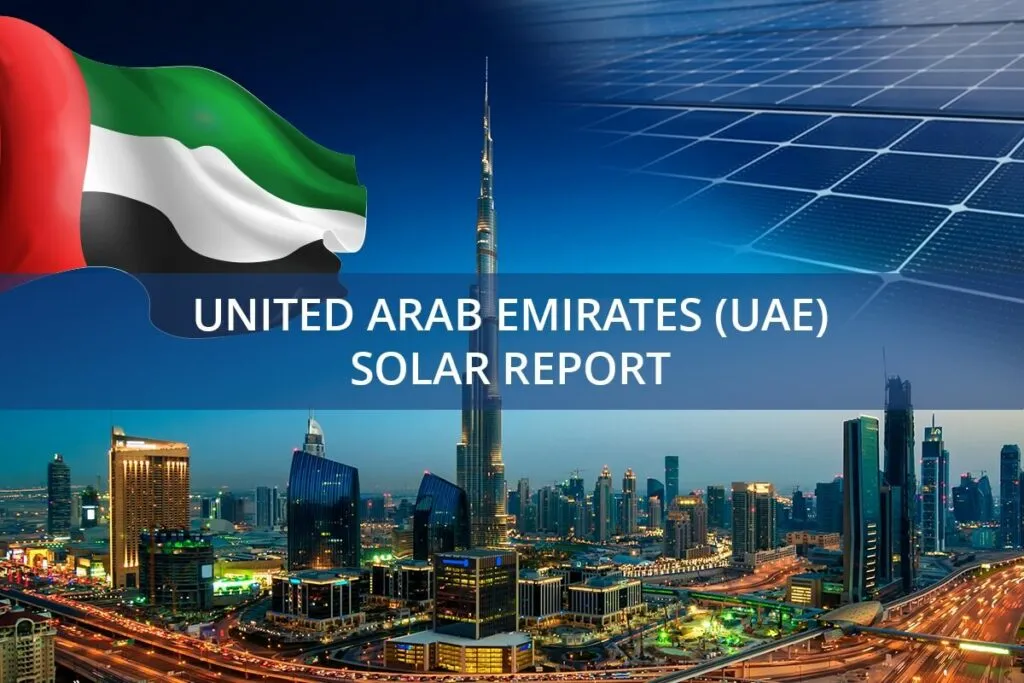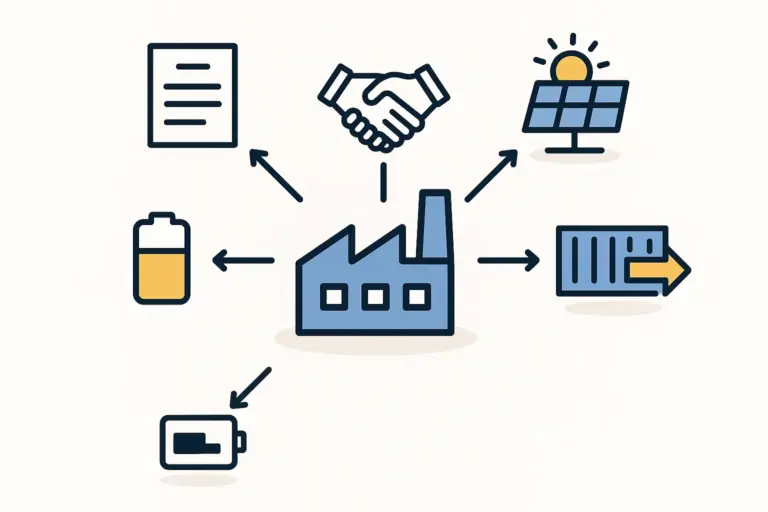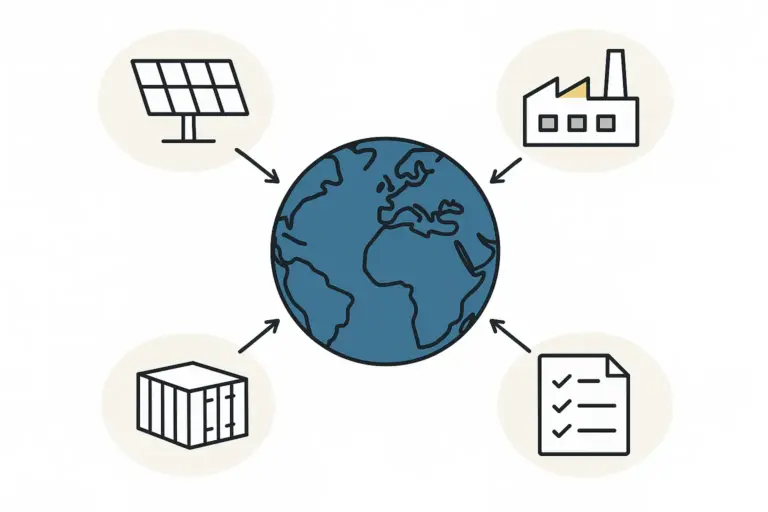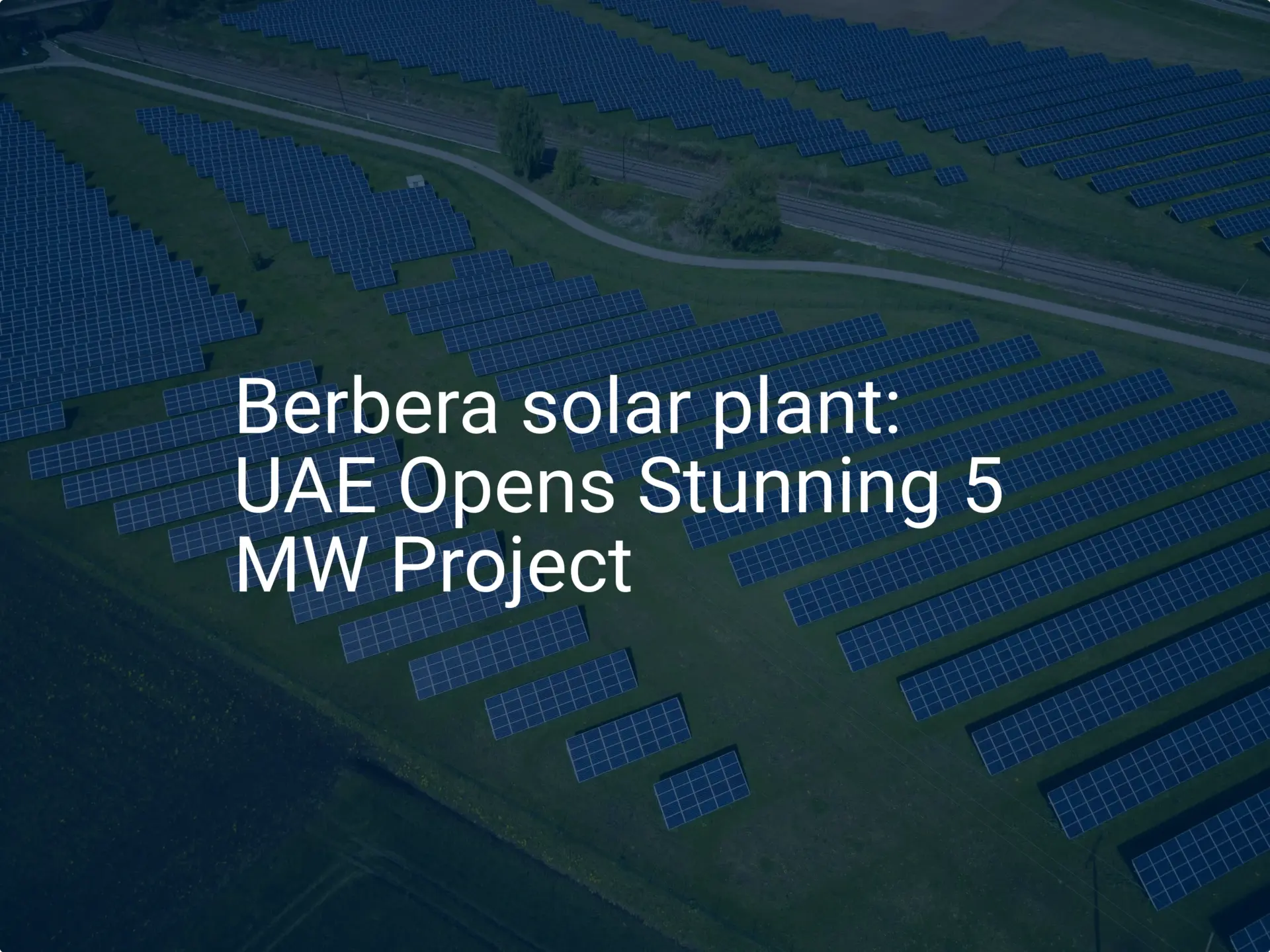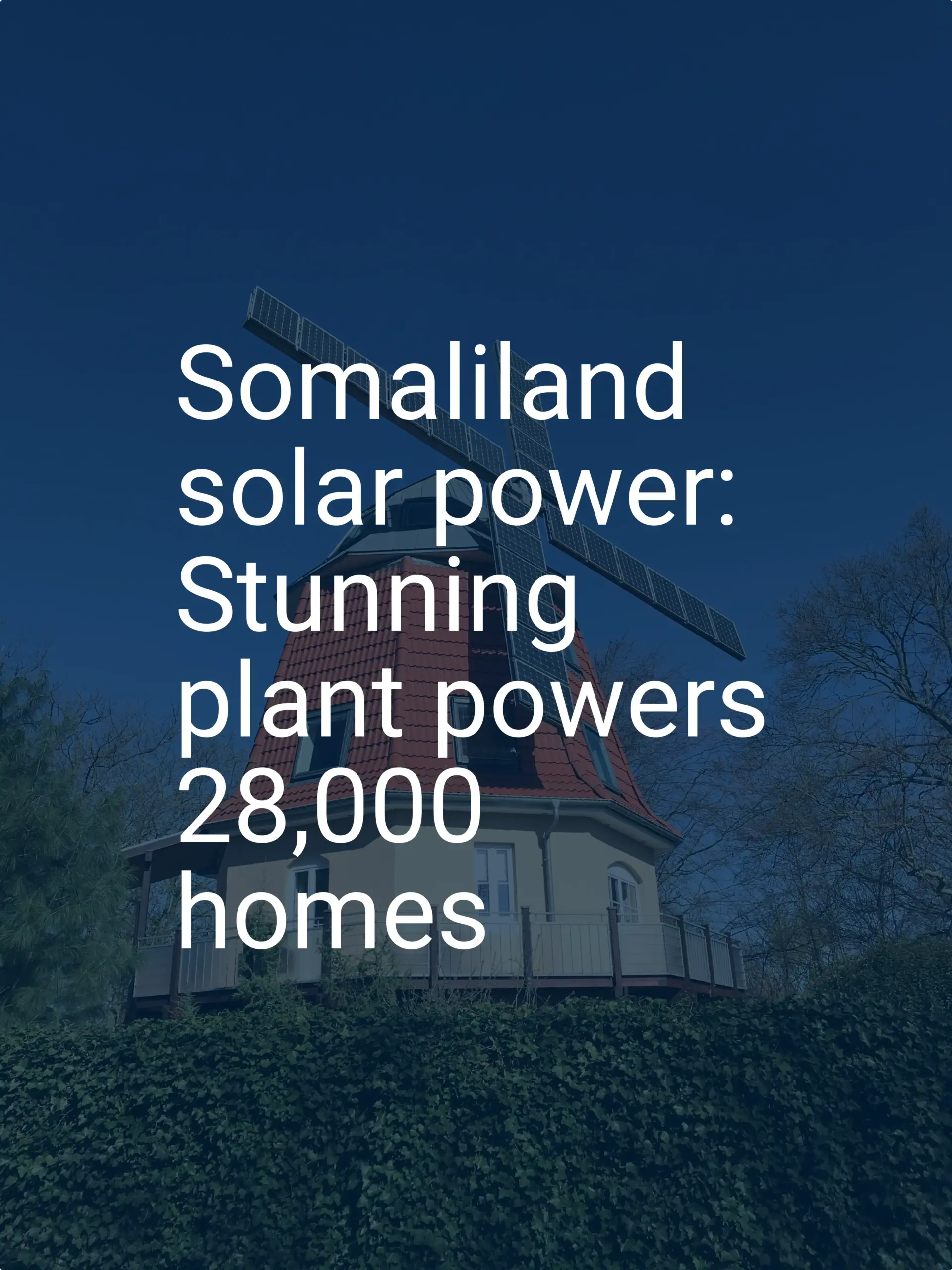The United Arab Emirates (UAE) is buzzing with activity in the renewable energy sector, with solar power at the heart of its ambitious journey toward a greener future.
For entrepreneurs and business leaders with their sights set on this burgeoning market, the UAE offers far more than just year-round sunshine. It boasts a remarkably well-developed infrastructure, thoughtfully designed to support ventures in solar module manufacturing. Understanding this foundational support—from its robust power grids and efficient transport networks to specialized industrial zones—is the crucial first step to establishing successful factories in the UAE.
So, what makes the UAE such a compelling destination for solar manufacturing? Let’s take a closer look at the key infrastructural elements that can give your project the strong, confident start it deserves.
Table of Contents
The UAE’s Vision: Powering the Future with Solar
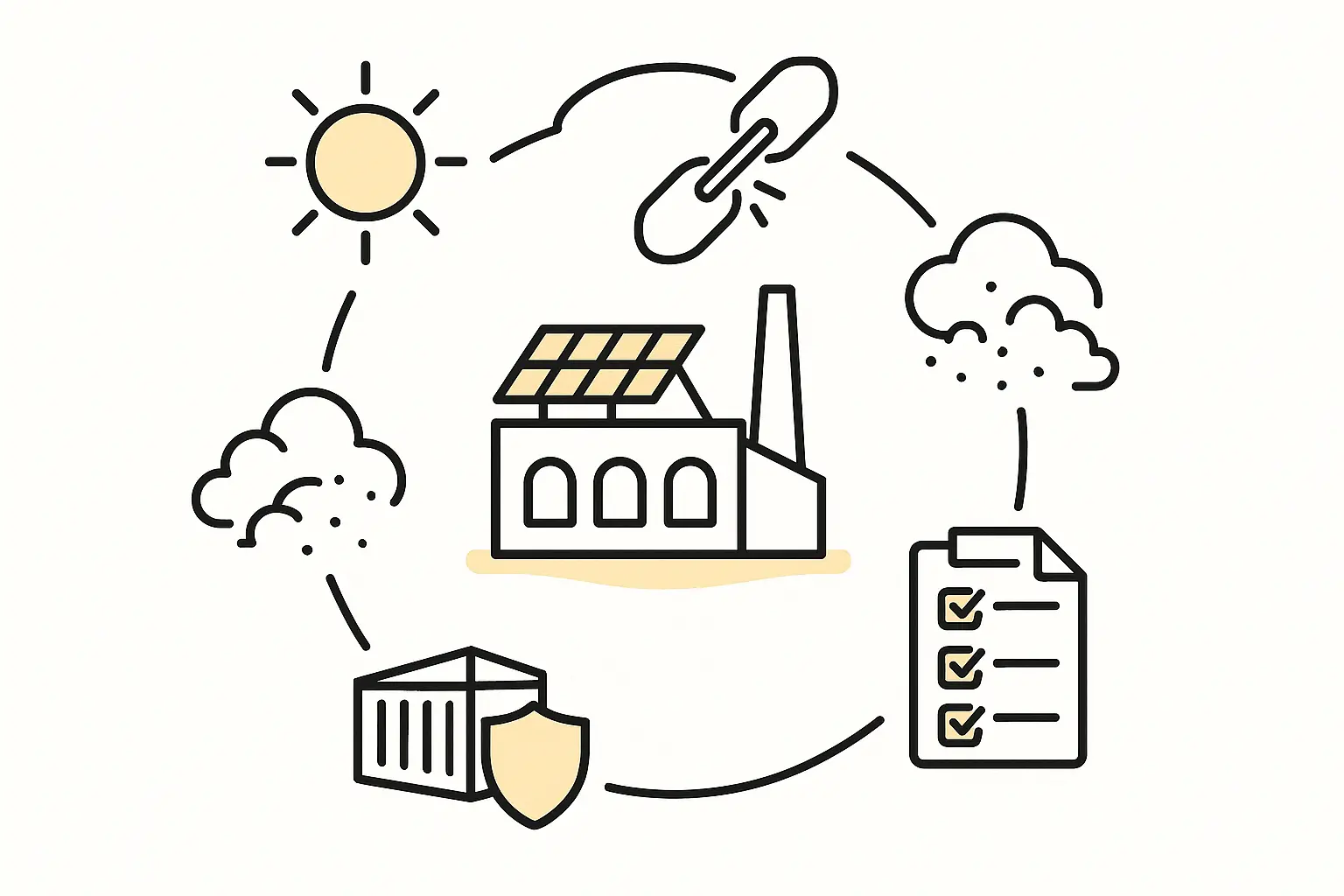
The UAE isn’t just dipping its toes into sustainability; it’s making a full-on dive with bold national strategies charting the course. The UAE National Energy Strategy 2050 and the Net Zero by 2050 strategic initiative aren’t just fancy names—they signal a monumental shift toward clean and renewable energy. The goals are ambitious: achieving 44% renewable energy in the country’s total energy mix by 2050 and tripling renewable capacity to 14 GW by 2030. To make this vision a reality, the UAE is investing around $54 billion by 2030 to meet its energy demands and supercharge clean energy projects.
A fascinating part of this vision is the dedicated push for local solar manufacturing. By nurturing a domestic solar production sector, the UAE aims to bolster its energy security, create valuable skilled jobs, and position itself as a key exporter of solar technology. This strategic focus fosters a supportive and encouraging environment for businesses ready to establish solar panel factories.
Powering Production: UAE’s Electricity Grid Assessment
For any manufacturing plant, especially one dealing with the energy-intensive processes of solar module production, a reliable and affordable power supply isn’t just a “nice-to-have”—it’s critical. The good news is that the UAE’s electricity infrastructure is more than ready to meet this challenge head-on.
Grid Capacity and Reliability
The UAE is equipped with a modern, strong, and impressively dependable national power grid.
- Installed Solar Capacity: As of early 2024, the UAE had over 7.9 GW of installed solar capacity. This impressive number is thanks largely to major projects like the 2 GW Al Dhafra Solar PV plant (the world’s largest single-site solar plant), Noor Abu Dhabi, and the Mohammed bin Rashid Al Maktoum Solar Park. With no signs of slowing down, the solar power market is expected to expand to a staggering 36.06 GW by 2029.
- Grid Stability: The country’s electricity grid boasted a reliability factor of 99.86% in 2023. To put that into perspective, the Dubai Electricity and Water Authority (DEWA) reported a remarkably low 1.19 customer minutes lost (CML) per year in 2022 and has cut transmission and distribution losses to just 2.2%. That’s stability you can build on.
Suitability for Solar Factories
The UAE’s grid isn’t just robust; it’s specifically designed to handle large industrial consumers, which translates into clear benefits for solar manufacturers:
- Handling Industrial Loads: You can rest assured that the grid infrastructure is well-equipped to manage the significant and steady power demands that come part and parcel with modern solar manufacturing lines.
- Cost-Effective Electricity: The UAE has achieved some of the world’s lowest costs for solar energy, with large-scale projects generating power for as little as 1.35–1.69 US cents per kilowatt-hour. This helps keep industrial electricity tariffs competitive, a key factor in managing production costs effectively.
- Key Utility Providers: Leading players like the Dubai Electricity and Water Authority (DEWA), Abu Dhabi National Energy Company (TAQA), Sharjah Electricity, Water and Gas Authority (SEWA), Emirates Water and Electricity Company (EWEC), and Abu Dhabi Transmission and Despatch Company (Transco) work in coordination to ensure efficient power generation, transmission, and distribution across the Emirates.
Future Grid Enhancements
The UAE is not resting on its laurels. Investment continues to flow into grid modernization and expansion, including cutting-edge smart grid technologies and innovative energy storage solutions. This ongoing development will further strengthen its capacity to integrate more renewable energy and support industrial growth, ensuring the power infrastructure keeps pace with the evolving needs of manufacturers.
Logistical Edge: UAE’s Transportation Network for Solar Supply Chains
Smooth, seamless logistics are the backbone of any successful manufacturing operation, ensuring raw materials flow in without a hitch and finished products reach markets on time. In this regard, the UAE’s top-tier transportation network offers a tangible competitive advantage for solar manufacturers.
Overview of UAE as a Logistics Hub
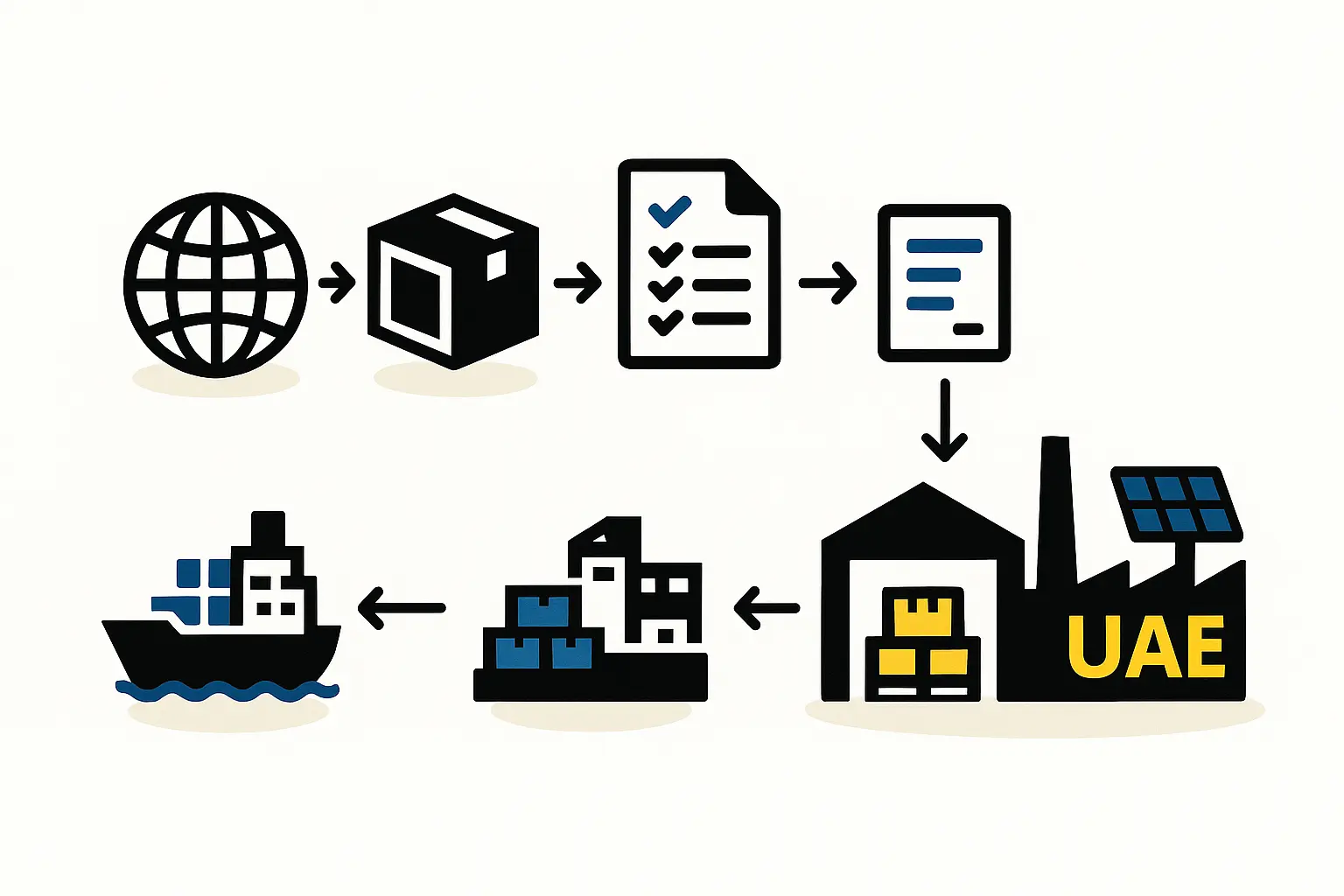
Thanks to its strategic position at the crossroads of global trade routes, the UAE has firmly cemented itself as a leading international logistics hub. Its infrastructure makes connecting to markets across Asia, Europe, Africa, and beyond remarkably straightforward.
Maritime Infrastructure
The UAE’s ports are not just busy; they are among the most advanced and efficient in the world:
- Jebel Ali Port (Dubai): As one of the world’s largest container ports, Jebel Ali is well-equipped to handle everything from the import of raw materials like glass, aluminum frames, and silicon to the export of finished solar modules.
- Khalifa Port (Abu Dhabi): This deep-water port, featuring cutting-edge technology, is a vital gateway for industries in Abu Dhabi, especially those located in the nearby KEZAD industrial zone.
These ports provide a full suite of services beyond berths, including streamlined customs clearance, extensive warehousing options, and excellent multimodal connectivity.
Air Freight Infrastructure
When time is of the essence for high-value components or urgent shipments, the UAE’s air freight capabilities are outstanding:
- Dubai International Airport (DXB): A major global hub for air cargo, known for its efficiency.
- Al Maktoum International Airport (DWC) (Dubai World Central): Envisioned as one of the world’s largest cargo airports, DWC is integrated with Jebel Ali Port and surrounding logistics districts. This creates a highly efficient sea-air freight corridor—a smart solution for agile supply chains.
Land Transportation
- Road Network: The UAE boasts an extensive and well-maintained highway network, efficiently linking industrial zones, ports, airports, and urban centers.
- Etihad Rail: The ongoing development of the Etihad Rail network is poised to transform freight transport within the UAE and across the wider GCC. This national railway project will significantly boost connectivity between industrial hubs and logistics gateways, providing a cost-effective and sustainable way to move bulk materials and finished goods.
Streamlining Logistics
Furthermore, the UAE government is proactive in streamlining operations through initiatives like the Logistics Integration Council, aimed at enhancing supply chain efficiency, cutting costs, and improving coordination among logistics providers and authorities.
Strategic Locations: Specialized Industrial Zones for Solar Manufacturing
A key element of the UAE’s offering is its excellent selection of specialized industrial and free zones. These are designed to attract foreign investment and simplify the practicalities of manufacturing.
Think of these zones as providing a “plug-and-play” environment, complete with robust infrastructure, reliable utilities, and comprehensive business support services.
Overview of UAE’s Industrial Zone Ecosystem
These zones are a cornerstone of the UAE’s strategy for industrial diversification. They typically come packed with attractive perks like 100% foreign ownership (a huge plus in free zones), tax exemptions, simplified customs procedures, and ready access to a skilled workforce.
Deep Dive into Key Zones
Several zones stand out as particularly promising for setting up solar module manufacturing facilities:
- Khalifa Economic Zones Abu Dhabi (KEZAD Group):
- What KEZAD Offers: Here, you’ll find vast industrial land, flexible pre-built warehousing options, a solid utility infrastructure, and fantastic connectivity through Khalifa Port. KEZAD is keen on fostering a competitive business environment with a variety of licensing options to suit different needs.
- Its Solar Connection: KEZAD is actively working to attract renewable energy manufacturing. For instance, Abundance Solar Panels Industries is investing AED 55 million to establish a solar panel factory in the zone—a clear sign of confidence.
- Dubai Industrial City (DIC):
- What DIC Offers: As a large industrial hub within Dubai Wholesale City, DIC is tailored for medium and light manufacturing. It provides plots of land, pre-built warehouses, and reliable infrastructure, with the significant benefit of being close to Jebel Ali Port and Al Maktoum International Airport.
- Its Solar Connection: DIC is already home to various manufacturing and logistics companies, including those involved in the renewable energy sector. For example, Nippon Energy has acquired a solar panel unit and announced exciting plans for a 1GW HJT module plant in Dubai. The news of Almaden, a Chinese company, planning a major solar glass factory in the UAE underscores how attractive the region is for the entire solar value chain.
- Jebel Ali Free Zone (JAFZA):
- What JAFZA Offers: Strategically located right next to Jebel Ali Port, JAFZA is one of the world’s largest and most renowned free zones. This translates into unparalleled logistics advantages, the highly sought-after option for 100% foreign ownership, and complete exemption from corporate and personal income taxes.
- Industrial City of Abu Dhabi (ICAD):
- What ICAD Offers: ICAD serves a diverse range of industrial sectors, including heavy industries. It provides fully serviced land, essential utilities, and good connectivity, making it a suitable choice for large-scale manufacturing operations.
Common Incentives and Infrastructure
Across these zones, you will generally find a consistent suite of benefits that are appealing to solar manufacturers:
- Tax exemptions: This often includes generous corporate tax holidays and no import/export duties (especially valuable within free zones).
- 100% foreign ownership: A key, often decisive, advantage offered in free zones.
- Customs facilitation: Procedures are generally designed to be simple, quick, and efficient.
- Utility access: You can count on reliable provision of electricity, water, and telecommunications.
- Labor & Talent: There is access to a diverse and skilled workforce, with visa processes that are typically streamlined and business-friendly.
- Proximity to transport hubs: This helps significantly cut down lead times and keep crucial logistics costs in check.
Government Support and Regulatory Landscape
The UAE government isn’t just passively observing; it is actively championing local manufacturing in the renewable energy sector. This support comes through helpful policies and a clear, well-defined regulatory framework.
- Pro-Manufacturing Policies: Various forward-thinking initiatives are in place to encourage industrial development and significantly boost local value addition.
- Certification and Standards: It’s important to note that solar panels sold or installed in the UAE generally need to meet standards set by the Emirates Authority for Standardization and Metrology (ESMA). These are often aligned with international IEC standards, which helps ensure quality, reliability, and global marketability.
- Investment Incentives: Beyond the specific benefits offered within the zones, the government works tirelessly to maintain a stable, predictable, and investor-friendly environment.
- Net Metering Policies: Programs like DEWA’s Shams Dubai initiative are doing a fantastic job of encouraging rooftop solar installations. They allow consumers and businesses to generate their own electricity and send any surplus back to the grid. While this is primarily aimed at consumers, it contributes to overall market growth and acceptance, which could benefit factories with large rooftop spaces suitable for their own solar arrays.
- Tax and Duty Advantages: The UAE generally boasts a favorable tax environment, and specific exemptions for solar equipment can further help reduce both setup and ongoing operational costs.
Why the UAE for Your Solar Factory? Key Advantages Summarized
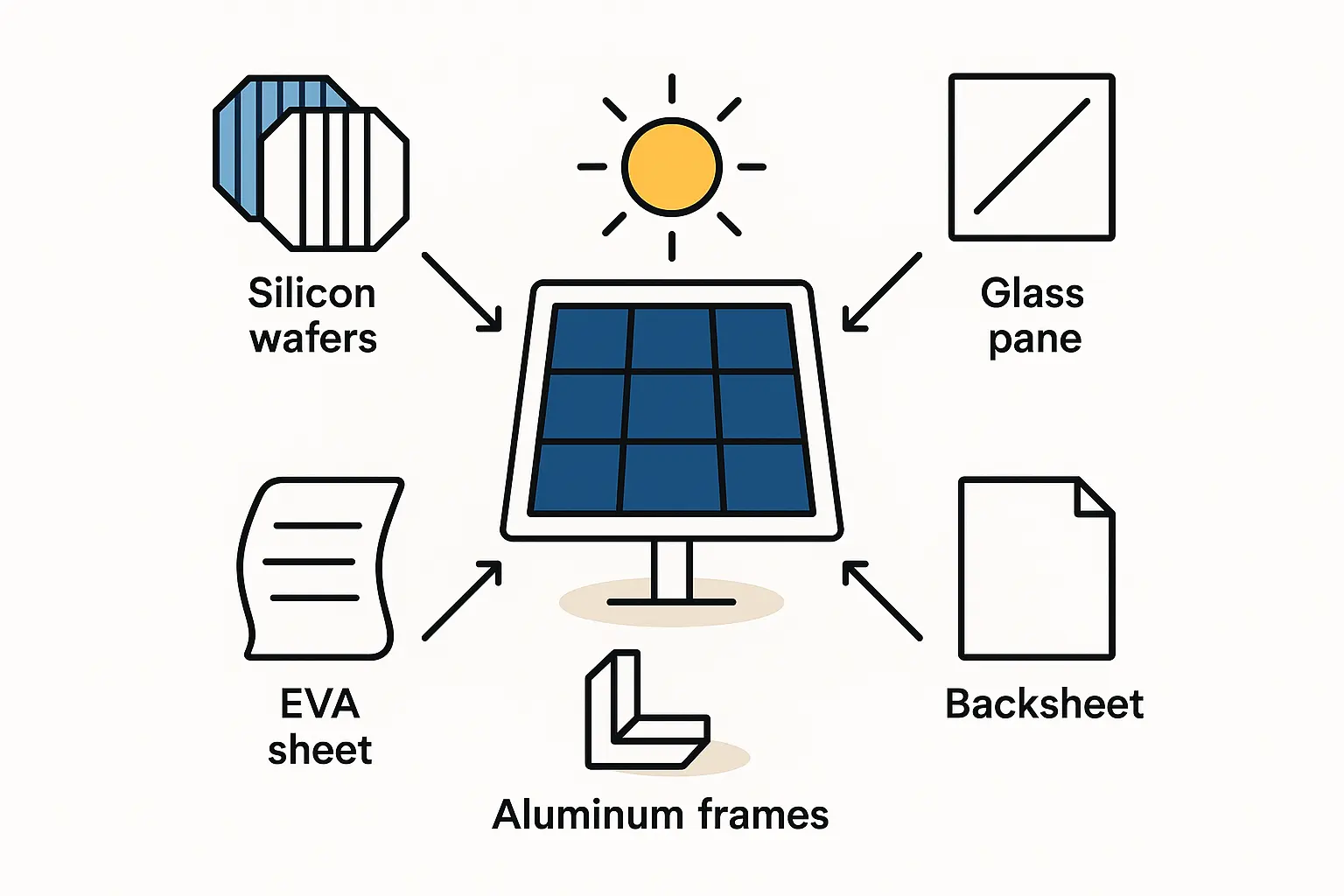
When it all comes down to it, the UAE presents a compelling case for establishing a solar panel manufacturing facility, based on these key advantages:
- Stable and Advanced Power Infrastructure: Access to a reliable, high-capacity grid with increasingly affordable electricity is vital for keeping production lines running smoothly and efficiently.
- World-Class Logistics Network: Superior sea, air, and land connections make managing a complex supply chain for both raw materials and finished products much easier.
- Dedicated Industrial Zones: These purpose-built zones offer tailored infrastructure, attractive incentives, and a business ecosystem genuinely geared for success.
- Strong Government Backing: A clear national vision for renewable energy is backed by supportive policies and a tangible commitment to attracting and nurturing investment.
- Growing Domestic and Regional Market: Demand for solar energy is undeniably on the rise, not just within the UAE itself but across the wider MENA region, opening up exciting opportunities.
Charting Your Course to Solar Manufacturing Success in the UAE
The UAE’s robust power infrastructure, globally connected transportation networks, and thoughtfully developed industrial zones offer an exceptional foundation for solar module manufacturing. Combined with strong government support and a clear vision for a solar-powered future, the Emirates presents a powerful launchpad for businesses looking to become an integral part of the clean energy revolution.
Of course, taking an idea from a promising concept to a fully operational solar factory takes deep expertise, meticulous planning, and a steady hand. That’s precisely where we at PVknowhow.com come in.
With over two decades of hands-on experience in the photovoltaic industry, we are here to guide entrepreneurs and companies like yours through every step of this exciting and rewarding process.
Inspired by how the UAE’s infrastructure can launch your solar manufacturing venture? We’re excited to hear your ideas! Discover more about Solar Manufacturing Opportunities in the UAE or, to discuss your specific project, contact us for a personalized consultation. Let’s power your solar ambitions together!

